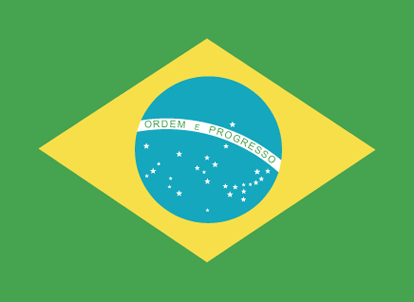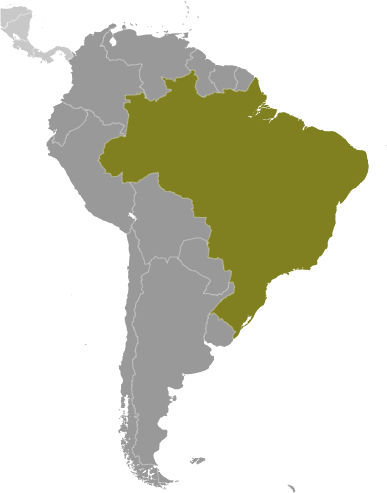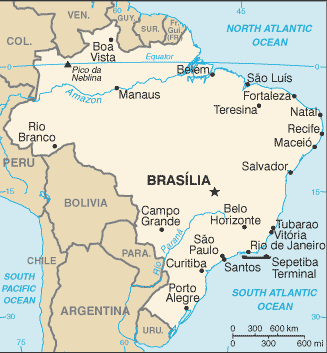Following more than three centuries under Portuguese rule, Brazil gained its independence in 1822, maintaining a monarchical system of government until the abolition of slavery in 1888 and the subsequent proclamation of a republic by the military in 1889. Brazilian coffee exporters politically dominated the country until populist leader Getulio VARGAS rose to power in 1930. By far the largest and most populous country in South America, Brazil underwent more than half a century of populist and military government until 1985, when the military regime peacefully ceded power to civilian rulers. Brazil continues to pursue industrial and agricultural growth and development of its interior. Exploiting vast natural resources and a large labor pool, it is today South America's leading economic power and a regional leader, one of the first in the area to begin an economic recovery. Highly unequal income distribution and crime remain pressing problems. In January 2010, Brazil assumed a nonpermanent seat on the UN Security Council for the 2010-11 term.
Country Name
Conventional long form:Federative Republic of Brazil
Conventional short form:Brazil
Local long form: Republica Federativa do Brasil
Local short form:Brasil
Government Type
federal republic
Capital
Name:Brasilia
Geographic coordinates:15 47 S, 47 55 W
Time difference: UTC-3 (2 hours ahead of Washington, DC during Standard Time)
daylight saving time: +1hr, begins third Sunday in October; ends third Sunday in February
note: Brazil is divided into three time zones, including one for the Fernando de Noronha Islands
Administrative divisions
26 states (estados, singular - estado) and 1 federal district* (distrito federal); Acre, Alagoas, Amapa, Amazonas, Bahia, Ceara, Distrito Federal*, Espirito Santo, Goias, Maranhao, Mato Grosso, Mato Grosso do Sul, Minas Gerais, Para, Paraiba, Parana, Pernambuco, Piaui, Rio de Janeiro, Rio Grande do Norte, Rio Grande do Sul, Rondonia, Roraima, Santa Catarina, Sao Paulo, Sergipe, Tocantins
Independence
7 September 1822 (from Portugal)
National Holiday
Independence Day, 7 September (1822)
Constitution
5 October 1988
Legal system
based on Roman codes; has not accepted compulsory ICJ jurisdiction
Suffrage
voluntary between 16 and 18 years of age and over 70; compulsory over 18 and under 70 years of age; note - military conscripts do not vote
Executive branch
Chief of state:President Luiz Inacio LULA da Silva (since 1 January 2003); Vice President Jose ALENCAR Gomes da Silva (since 1 January 2003); note - the president is both the chief of state and head of government
Head of government:President Luiz Inacio LULA da Silva (since 1 January 2003); Vice President Jose ALENCAR Gomes da Silva (since 1 January 2003)
Cabinet:Cabinet appointed by the president
(For more information visit the World Leaders website)
Elections:president and vice president elected on the same ticket by popular vote for a single four-year term; election last held on 1 October 2006 with runoff on 29 October 2006 (next to be held on 3 October 2010 and, if necessary, 31 October 2010)
Election results:Luiz Inacio LULA da Silva (PT) reelected president - 60.83%, Geraldo ALCKMIN (PSDB) 39.17%
Legislative branch
bicameral National Congress or Congresso Nacional consists of the Federal Senate or Senado Federal (81 seats; 3 members from each state and federal district elected according to the principle of majority to serve eight-year terms; one-third and two-thirds of members elected every four years, alternately) and the Chamber of Deputies or Camara dos Deputados (513 seats; members are elected by proportional representation to serve four-year terms)
Elections: Federal Senate - last held on 1 October 2006 for one-third of the Senate (next to be held in October 2010 for two-thirds of the Senate); Chamber of Deputies - last held on 1 October 2006 (next to be held in October 2010)
Election results:Federal Senate - percent of vote by party - NA; seats by party - PFL 6, PSDB 5, PMDB 4, PTB 3, PT 2, PDT 1, PSB 1, PL 1, PPS 1, PRTB 1, PP 1, PCdoB 1; Chamber of Deputies - percent of vote by party - NA; seats by party - PMDB 89, PT 83, PFL 65, PSDB 65, PP 42, PSB 27, PDT 24, PL 23, PTB 22, PPS 21, PCdoB 13, PV 13, PSC 9, other 17; note - as of 1 February 2010, the composition of the entire legislature is as follows: Federal Senate - seats by party - PMDB 17, DEM (formerly PFL) 16, PSDB 14, PT 11, PTB 7, PDT 6, PR 3, PRB 2, PSB 2, PCdoB 1, PP 1, PSC 1, PV 1, PSOL 1; Chamber of Deputies - seats by party - PMDB 88, PT 77, PSDB 57, DEM (formerly PFL) 56, PR 43, PP 38, PSB 27, PDT 23, PTB 25, PPS 15, PV 15, PSC 16, PCdoB 12, PRB 8, PHS 3, PMN 3, PSOL 3, PTC 3, PTdoB 1
Judicial branch
Supreme Federal Tribunal or STF (11 ministers are appointed for life by the president and confirmed by the Senate); Higher Tribunal of Justice; Regional Federal Tribunals (judges are appointed for life); note - though appointed "for life," judges, like all federal employees, have a mandatory retirement age of 70
Political Parties and Leaders
Brazilian Democratic Movement Party or PMDB [Federal Deputy Michel TEMER]; Brazilian Labor Party or PTB [Roberto JEFFERSON]; Brazilian Renewal Labor Party or PRTB [Jose Levy FIDELIX da Cruz]; Brazilian Republican Party or PRB [Vitor Paulo Araujo DOS SANTOS]; Brazilian Social Democracy Party or PSDB [Senator Sergio GUERRA]; Brazilian Socialist Party or PSB [Governor Eduardo Henrique Accioly CAMPOS]; Christian Labor Party or PTC [Daniel TOURINHO]; Communist Party of Brazil or PCdoB [Jose Renato RABELO]; Democratic Labor Party or PDT [Carlos Roberto LUPI]; the Democrats or DEM [Federal Deputy Rodrigo MAIA] (formerly Liberal Front Party or PFL); Freedom and Socialism Party or PSOL [Heloisa HELENA]; Green Party or PV [Jose Luiz de Franca PENNA]; Humanist Party of Solidarity or PHS [Paulo Roberto MATOS]; Labor Party of Brazil or PTdoB [Luis Henrique de Oliveira RESENDE]; Liberal Front Party or PFL (now known as the Democrats or DEM); National Mobilization Party or PMN [Oscar Noronha FILHO]; Party of the Republic or PR [Sergio TAMER]; Popular Socialist Party or PPS [Federal Deputy Fernando CORUJA]; Progressive Party or PP [Francisco DORNELLES]; Social Christian Party or PSC [Vitor Jorge Abdala NOSSEIS]; Workers' Party or PT [Ricardo Jose Ribeiro BERZOINI]
Political pressure groups and leaders
Landless Workers' Movement or MST
Other:labor unions and federations; large farmers' associations; religious groups including evangelical Christian churches and the Catholic Church
International organization participation
AfDB (nonregional member), BIS, CAN (associate), CPLP, FAO, FATF, G-15, G-20, G-24, G-77, IADB, IAEA, IBRD, ICAO, ICC, ICCt, ICRM, IDA, IFAD, IFC, IFRCS, IHO, ILO, IMF, IMO, IMSO, Interpol, IOC, IOM, IPU, ISO, ITSO, ITU, ITUC, LAES, LAIA, LAS (observer), Mercosur, MIGA, MINURCAT, MINURSO, MINUSTAH, NAM (observer), NSG, OAS, OPANAL, OPCW, Paris Club (associate), PCA, RG, SICA (observer), UN, UN Security Council (temporary), UNASUR, UNCTAD, UNESCO, UNFICYP, UNHCR, UNIDO, Union Latina, UNITAR, UNMIL, UNMIS, UNMIT, UNOCI, UNWTO, UPU, WCO, WFTU, WHO, WIPO, WMO, WTO
Diplomatic representation in the US
Chief of mission:Ambassador Mauro Luiz Iecker VIEIRA
Chancery:3006 Massachusetts Avenue NW, Washington, DC 20008
note: temporary address - 1025 Thomas Jefferson St. NW, Suite 300 W, Washington, DC
Telephone:[1] (202) 238-2805
FAX:[1] (202) 238-2827
Consulate(s) general:Boston, Chicago, Houston, Los Angeles, Miami, New York, San Francisco, Washington DC
Diplomatic representation from the US
Chief of mission:Ambassador Clifford M. SOBEL
Embassy:Avenida das Nacoes, Quadra 801, Lote 3, Distrito Federal Cep 70403-900, Brasilia
Mailing address:Unit 7500, DPO, AA 34030
Telephone:[55] (61) 3312-7000
FAX:[55] (61) 3225-9136
consulate(s) general: Rio de Janeiro, Sao Paulo
consulate(s): Recife
Flag description
green with a large yellow diamond in the center bearing a blue celestial globe with 27 white five-pointed stars (one for each state and the Federal District) arranged in the same pattern as the night sky over Brazil; the globe has a white equatorial band with the motto ORDEM E PROGRESSO (Order and Progress)










